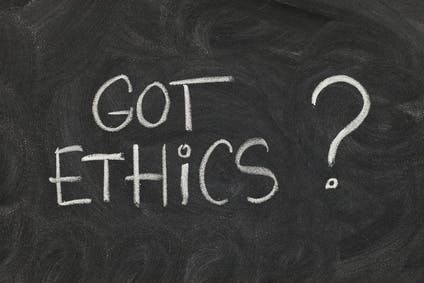We’ve all dealt with it: an unethical workplace.
While I’ve never come down hard on an occasional ethical lapse, I’m bright enough to see patterns in behaviors that should be concerning.
Is seeing an employee walk out the door with a company supplied pen tucked in their front pocket different from a group of employees walking in every day 10 minutes late but writing in 8 am on their time card? Of course, but that doesn’t mean there is no connection to the events.
That being said, those in HR are often in the best position to see ethical lapses across the entire organization. What they do about it is about as important as almost anything else.
Classroom lessons
Dan Ariely is a great author and his book Predictable Irrationality is a favorite of mine. He recently wrote about an issue he dealt with in his classroom:
At the start of last semester, I asked my undergraduate students whether they had enough self-control to avoid using their computers during class for non-class related activities. So they promised that if they used their laptops, it would only be for course-related activities like taking notes. However, as the semester drew on, I noticed that progressively more and more students were checking Facebook, surfing the web and emailing. At the same time that they were Facebooking more and more, they were also cheating more and more on their weekly quizzes – and in a class of 500 students, it was hard to manage this deterioration. As my students’ attention and respect continued to degrade, I became increasingly frustrated.”
What happened next was interesting. A couple of his students took it upon themselves to set up an experiment. They wrote two emails to the students in class (half would get one email, the other half would get the alternative). In one of the emails, they supplied a link to the purported answers to the final exam. In the other email, they still supplied a link to it but, as a postscript note, they said that the university prohibited gaining any unfair advantage. The results?
Using Google Analytics, the students tracked how many people from each group visited the website. The disparaging news is that without the honor code reminder, about 69 percent of the class accessed the website with the answers. However, when the message included the reminder about the honor code, 41 percent accessed the website. As it turns out, students who were reminded of the honor code were significantly less likely to cheat. Now, 41 percent is still a lot, but it is much less than 69 percent.”
What’s the connection to work?
The Enron code of ethics
When the accounting scandals of the last decade hit, Enron was a prime target not only for their other-worldly abuse and unethical conduct but because their code of ethics was so contradictory to their actions. As Bob Sutton points out about the document:
It starts with a foreword from the late Kenneth Lay, who was back to being CEO by then, which opens with this sentence:
“As officers and employees of the Enron Corp., its subsidiaries, and its affiliated companies, we are responsible for conducting the business affairs of the companies in accordance with all applicable laws and in a moral and honest manner.”
Sutton also hypothesizes that the longer a code of ethics is (in this case, 60 plus pages), the more room there is for wiggling out of accountability.
While likely true, I don’t think it is connected to length alone.
Changing the tune
Combining the example from Ariely’s classroom and the code of ethics from Enron, I think we get a much clearer picture of what causes ethical breakdowns. It seems to be three parts:
- It must be clear — 60 plus pages may sound impressive but only when they have to literally throw the book at you. Ethics should be clear, there should be no wiggle room, and there should be no excuse why a person couldn’t read and clearly understand it in a few minutes.
- There must be reminders — Even when a policy is clear (like the university’s is about cheating), you still see a high percentage of people ignore it when convenient. When faced with major decisions, a reminder about the code of ethics can be imperative to preventing a some who would otherwise look to unethical action.
- Look out for culture creep — Slowly but surely, Ariely’s class turned into a place where ethical decisions were unclear. It started with an occasional flip over to Facebook (even though he asked at the beginning not to do so) and continued to grow from there. A culture of unethical behavior doesn’t come and go quickly.
The first two are easy but the third one is the most difficult. Connecting an isolated pen going out the door to corporate fraud at the highest levels may seem, well, silly. And it generally is: most people don’t go from pen theft to dispatching the retirement accounts of thousands.
But if it became a trend and other trends of unethical nature started popping up with more frequency, the time to deal with it is now.
